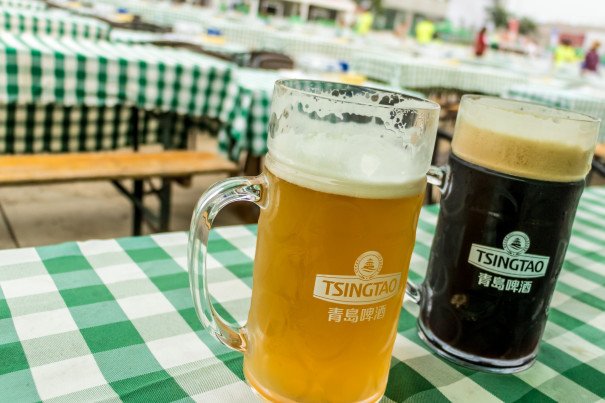
Tsingtao in China Is Actually Good

Tsingtao in China Is Actually Good
Tsingtao in Qingdao
In 1903, in this small corner of northeast China, the Germans built a brewery. They named it after the town, Tsingtao. The spelling has changed, but the beer remains the same.
To celebrate the city’s brewing heritage, every year it hosts an international beer festival. It’s barely international though, with only a few big-name European and American beers displayed here and there.
The Tsingtao brand, however, is ubiquitous, covering T-shirts, stage fronts, pavilions, coasters, pens, everything. Paulaner, Budweiser, and the others are but second-tier guests: this is a celebration of the hometown hero.
Qingdao learned to love beer because the Germans made them. Germany took control of Qingdao in 1897, the year two German Catholic missionaries, Richard Henle and Franz-Xavier Nies, were brutally murdered by a Chinese paramilitary group, the Big Swords Society.
Germany used this as a pretext to take control of the city and its environs, forcing the Chinese to sign a 99 year lease, similar to the one the British had in Hong Kong’s New Territories. Nominally, Qingdao was Chinese, and was just being rented; in actual fact, it was the newest addition to the German Empire.
This was the grand era of Chinese humiliation. One of the oldest continuing civilizations, 500 years earlier China had sent fleets of exploration to India, Africa, the Middle East, and maybe even America (though this is fiercely disputed). All its great inventions—the compass, paper, printing, plenty more—were traded throughout the world. Europe, meanwhile, was still recovering from the Black Plague and the Hundred Years War.
But all that changed. China stopped exploring and looked inward. Europeans took up the mantle of exploration, and the conquest of America made them obscenely rich, funding the scientific and industrial revolutions. Soon, Britain, France, Germany, Portugal, and others were using China’s most malevolent invention—gunpowder—against it.
For the next hundred years, the Europeans, and later the Japanese, ran roughshod over China—looting, plundering, backing opposing sides in terrible civil wars—until finally, China got an evil tyrant of their own powerful enough to push them out: Chairman Mao Zedong.
Mao is dead but he stays on the money; Qingdao is now Chinese but they’ve kept the brewery.
Tsingtao Breweries follows traditional German recipes and produces some of the best beer in Asia. The Tsingtao you get at Chinese restaurants in California is just what they export, and it isn’t much of anything, a Budweiser with Chinese characters on it.
The stuff they keep for themselves, on the other hand, is magnificent. The stout is bitter, creamy, and strong. The weizen is hoppy, citrusy, also creamy.
For two weeks, thousands of Chinese (and the occasional foreigner) come through the enormous beer festival and throw back huge quart-sized mugs of Tsingtao. Ostensibly, we’re celebrating getting drunk on beer, but whether we know it or not, we’re also celebrating the return of China as a global power: one that crushes the West in trade, buys America’s debts while selling America its goods, and all the while stages a beer festival as well as any European.